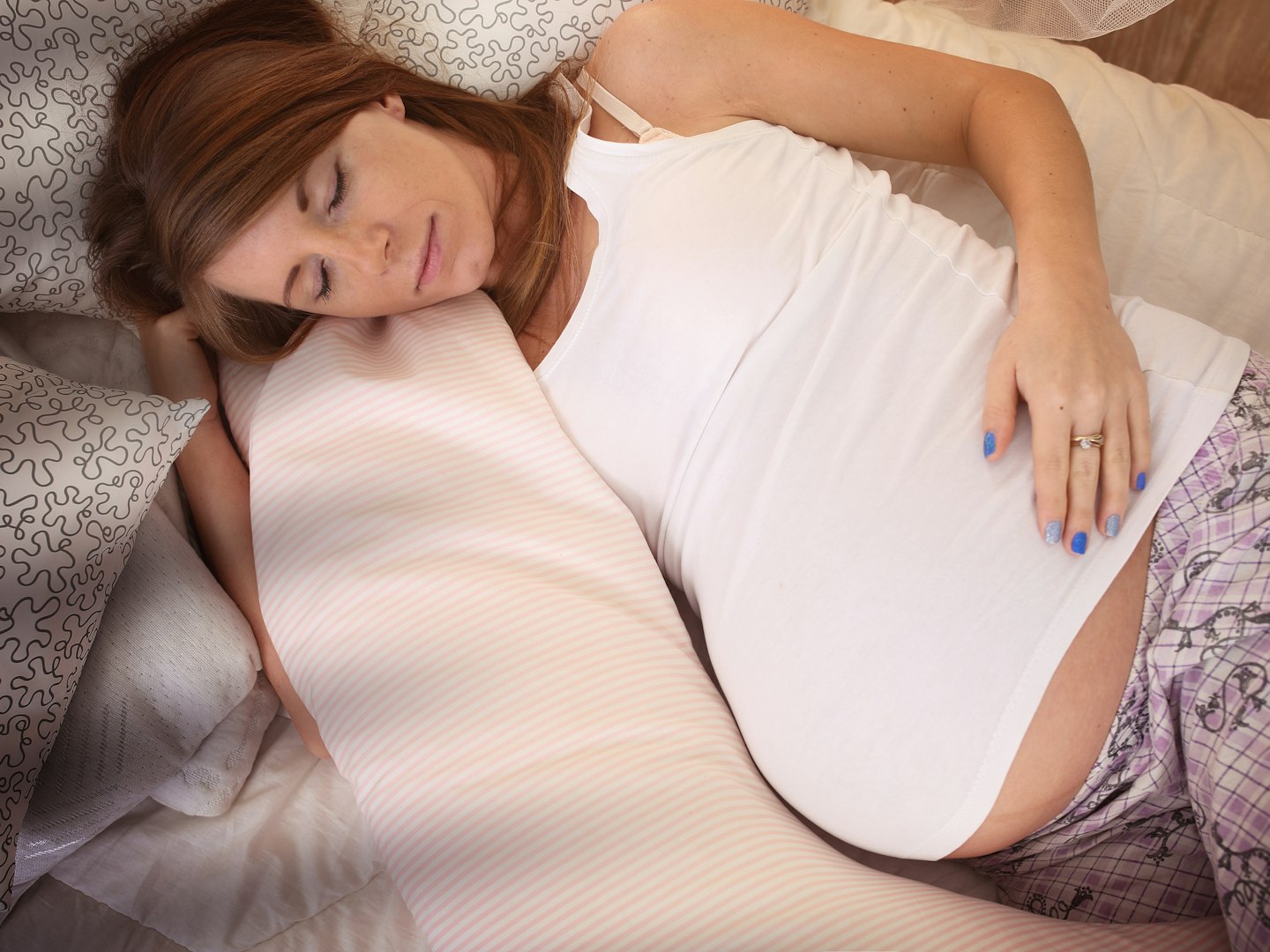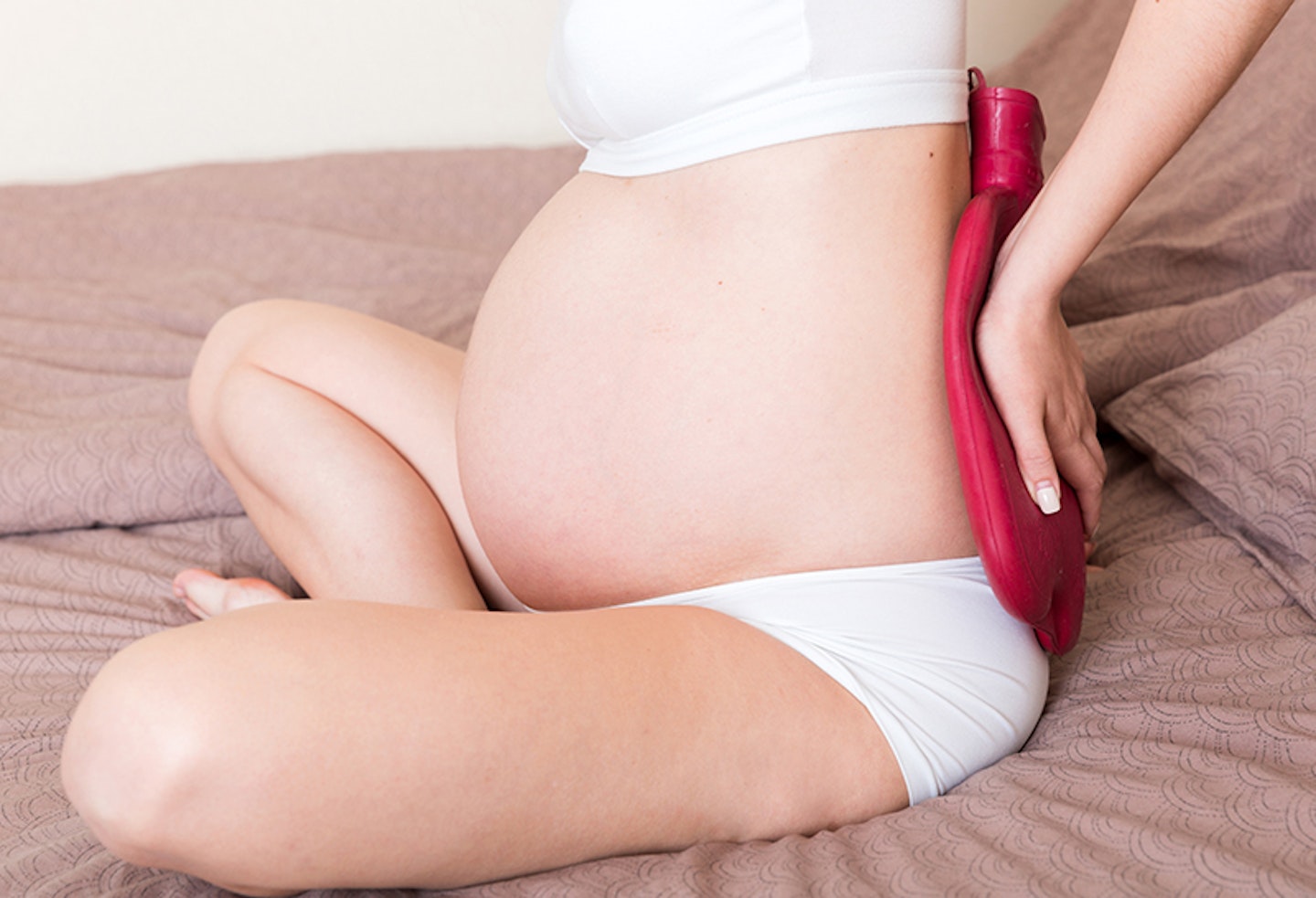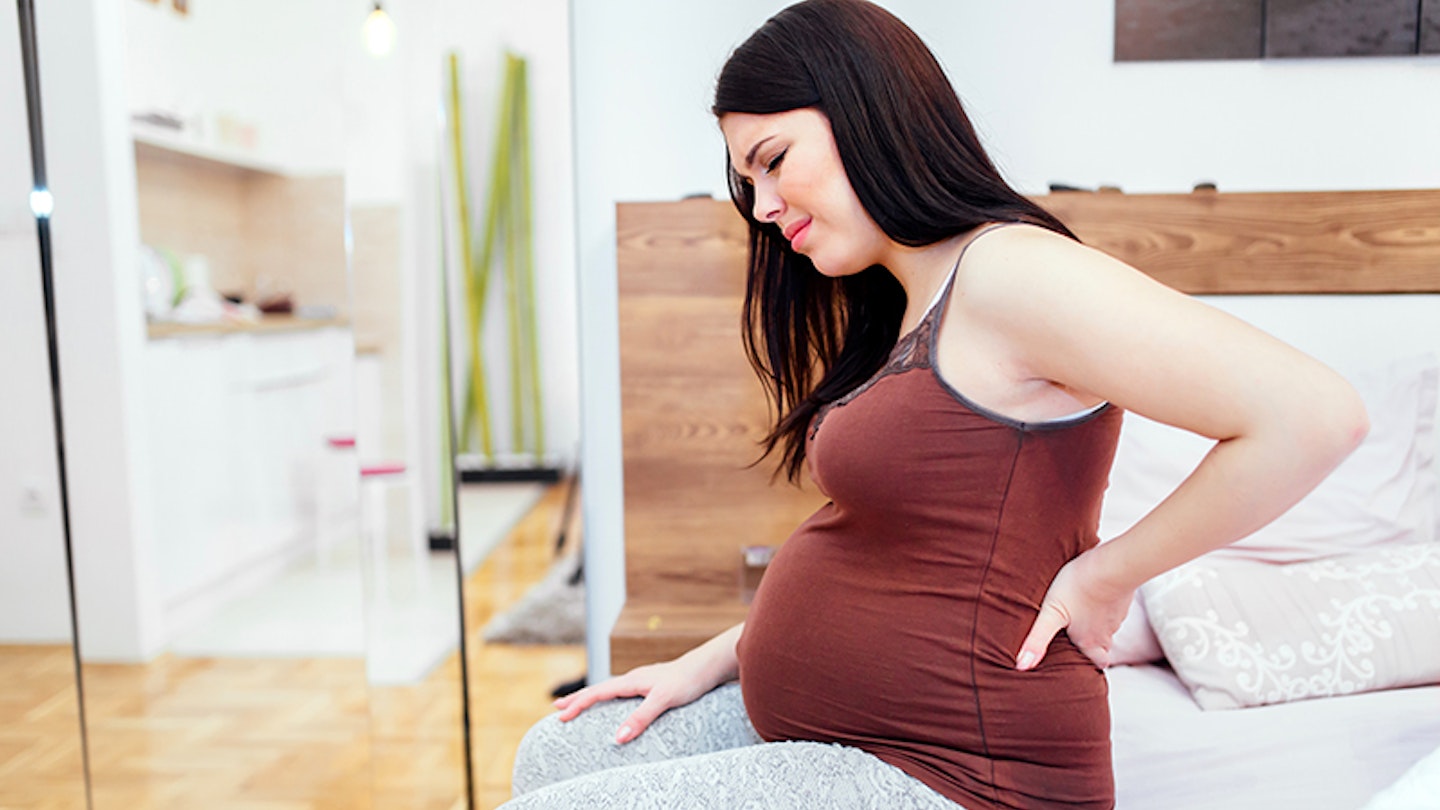
Medically Reviewed by: Midwife Pip, MSc BSc
Women have a lot to deal with through pregnancy; morning sickness, fatigue, heartburn, head aches not to mention back pain in pregnancy. It's estimated that around 70% of pregnant women will suffer from some kind of lower back pain during their pregnancies due to the physical changes happening in their body.
Why do I have back pain in pregnancy?
The NHS says that the ligaments in your body naturally become softer during pregnancy, stretching to prepare you for labour. Other physical changes include weight gain and an altered posture, which tend to strain the back and pelvic joints triggering back pain. Back pain is not limited to just the later stages of pregnancy when your growing uterus and baby push your centre of gravity forward; it can also be an early symptom of pregnancy.
We understand how uncomfortable back pain in pregnancy is, so to shed some light on how to soothe and reduce it, we speak to Physiotherapist Sammy Margo, Midwife Pip Davies and also Dr. Joanna Helcké PhD, a specialist in pre and postnatal fitness and ask them for their expert advice.
How to relieve back pain in pregnancy
While it's completely normal to experience back pain throughout pregnancy, there are some things you can do to help reduce and soothe any pain and discomfort while little one continues to grow.
1. Stay active
Pregnant or not, gentle exercise can go a long way to keeping your body and spine strong. "Regular walking and swimming will keep your muscles in good shape and your joints flexible, which supports your back," says Dr. Joanna. "Essentially, your joints are supported by ligaments and muscles — so, the stronger they are, the less your back will hurt", she says.
Strengthening your core muscles during pregnancy is good practice and helps prepare you for postnatal recovery. Pilates-style exercises are fantastic for this area fo your body, but you should seek advice from your GP or midwife before beginning an exercise routine, especially if you didn't exercise much before you were pregnant.
"A safe way to start is to sit on an exercise ball to eat your meals or while you watch TV," says Joanna, explaining that "your core muscles have to engage to keep you stable."
Low-impact exercises likepregnancy yoga or pilates are also a good way to strengthen your back and beat those aches and pains and they're also great opportunity to make new friends with mums-to-be in your local area. These exercises can also help your mental health during pregnancy reducing stress and anxiety.
2. Sleep comfortably

The NHS acknowledges that it's common to feel tired, and even exhausted, during pregnancy, especially in the first 12 weeks saying "hormonal changes at this time can make you feel tired, nauseous and emotional. The only answer is to rest as much as possible."
Of course, getting enough sleep isn't as easy as it sounds, especially if you're already struggling with a toddler or back pain, as this will make sleep a lot more uncomfortable, but sleeping on a firm mattress may help keep your back happy.
Another good good tip is to sleep try sleeping on your side, supported by pillows to take pressure off your bump and give your back a well-deserved break. "If backache is interrupting your sleep, tuck a cushion under your knees while you’re on your back," says Joanna. "This tilts your pelvis and gives your spine relief."
Pregnancy pillows are also great for helping support your body in the bed as your bump develops. They can really help you find a comfortable position to sleep in. When it comes to learning how to use a pregnancy pillow effectively, it'll depend on what kind you have.
3. Fix your posture
"Pregnancy is often the last straw for backs that have put up with years of bad posture and habits," says Physiotherapist Sammy Margo.
"Back posture is fundamental to general health and wellbeing," adds Sammy. "Your alignment affects your organs, breathing, muscles, digestion and fatigue. The effects of poor posture are amplified by pregnancy as ligaments become stretched - and the pain can continue after birth."
Here's a few good tips to help you establish good posture:
• When you’re walking, stop to link your hands behind your back to open your shoulders and get a sense of where your spine should be.
• When sitting, remember BBC - bum on back of chair - i.e sit on the bottom of your jean pockets, not the top.
4. Wear flat shoes
You may own some fabulous footwear, but for the next few months you'll have to say goodbye to your high heels. Stick to heels no higher than one and a half inches to help you keep your posture when pregnancy has thrown you off balance and your centre of gravity shifts. It's also a good idea to invest in insoles with good arch support - you won't believe how much it will help your back. Similarly, don't stand for long periods of time either but if you have to, make sure to take regular breaks.
5. Feel-good foods (and vitamins)
Omega-3 fatty acids found in fish, such as salmon, could help relieve back pain by calming inflammation in your blood vessels and nerves. Remember to eat the oily fish no more than twice a week though.
You could also take Omega-3 supplements (not cod liver oil), along with your prenatal vitamins and supplements, to keep levels topped up and keep back aches in check.
6. Soothe pains

Avoid anti-inflammatory painkiller gels with diclofenac, such as Voltarol Emulgel. While they are good for back pain as they block the chemicals that cause inflammation, stiffness and tenderness, they're not advised to use while pregnant, particularly in your third trimester.
Instead, opt for natural ways to soothe pain. Studies say acupuncture can be more effective than drugs, while a covered hot-water bottle can help relax tight muscles and boost circulation to ease inflammation.
You can take paracetamol when pregnant to ease back pain, unless your GP or midwife says not to.
7. Bend at the knees
Bending at the knees to pick things up, rather than curling your whole body forward, means you bear weight in your legs, not your spine. This is more important to do anyway but more so when you're pregnant as you start to carry more weight in front.
"To check you are doing this right, stand in front of a chair and bend as though you’re going to sit," says Joanna. "As your bottom is about to hit the chair, your back should be neutral, with your heels on the floor and your knees bent."
Think - squat down and lift, rather than putting more strain on your back. You should try to avoid lifting if possible, and ask your partner or children to help. Alternatively try to do things standing up or sitting down as much as possible when doing chores. For example, fold the laundry on your kitchen counter or table, and do the ironing while sitting on the sofa.
8. Mix up your movements
Repetitive movements can trigger pain, so if you're working from home or sitting at a desk all day, try to mix things up by taking regular short breaks. Even a circuit of the room while stretching your arms behind your back, can make a difference. Sit in a chair with a supportive back or put a small pillow at the small of your back, and of course try to sit up straight.
If you're already a mum, feeding, changing nappies and lifting your baby involve a series of repetitive movements. The best way to avoid this, while it may feel unnatural, is to try to alternate the side on which you hold your baby.
9. Consider a pregnancy massage
A gentle prenatal massage is a great way to get rid of aches, pains and general discomfort during pregnancy. Studies have shown that women who received massage therapy experienced significantly less pain plus, labour was on average three hours shorter with less need for medication. Check with your GP or midwife first and always have a massage that’s specifically tailored for pregnancy.
10. Strengthening
Midwife Pip believes that strengthening your body during pregnancy is one of the best things you can do to help yourself. "Not only can it help you stay more comfortable, but it also supports your posture, reduces common aches, prepares your body for birth, and can make postpartum recovery smoother.
Many of the typical discomforts in pregnancy like back, hip, or pelvic pain often stem from weakness in those areas or nearby muscles. As your body changes and carries more weight, those imbalances can start to show up as pain." She goes on to note that you don’t need fancy equipment or a gym membership to build strength suggesting that even simple movements at home can work well. In fact Pip adds that The Royal College of Obstetricians and Gynaecologists (RCOG) recommend aiming for two strength-based workouts per week during pregnancy "because the benefits of a stronger, more functional body are just that important, so as long as there are no medical contraindications, you can begin strength training even if you’ve never done it before."
FAQ: Back pain in pregnancy
When does back pain start in pregnancy?
Studies show that lower back pain usually occurs between the fifth and seventh months of being pregnant, although in some cases it begins as early as eight to 12 weeks.
Is lower back pain normal in early pregnancy?
Yes. This pain in your lower spine or even your pelvis (pelvic girdle pain) is caused by a pregnancy hormone called relaxin, which makes your ligaments and joints relax and become looser, so your body is ready to give birth.
Pregnancy hormones temporarily loosen your ligaments, making your back vulnerable. Add in the effect a bump has on your posture and the pressure of a baby on your spinal nerves, and it’s easy to see why back problems are so prevalent in mums.
What being pregnant does to your spine
The same hormone that prepares your pelvis for childbirth can cause ligaments that support the spine to loosen, leading to instability and pain. As baby grows, because of the weight gain, as well as the change in your center of gravity (as you're holding more weight in front of you), your spine is susceptible to aches, pains and injuries from being extended in new, different ways.
Your spine can also become rotated during your pregnancy, particularly if you suffered from back pain before you were pregnant, which can lead to slipped discs and sciatica if left untreated.
You may find that wearing a maternity support belt or belly band helps alleviate your back pain, but there are lots of other ways to soothe back aches too.
How does scoliosis affect pregnancy?
Most pregnant women with sideways curvature of the spine, or scoliosis, will find that their condition doesn't affect their pregnancy at all.
However, women with severe curvature of the spine, or those whose scoliosis involves the hips, pelvis or shoulders, may experience more pain and discomfort, breathing problems or weight-bearing difficulties — especially later in the pregnancy.
Back pain in pregnancy — third trimester
If you're experiencing back pain in your third trimester, let your midwife or GP know, as it could be a sign of early labour.
When should I worry about back pain in pregnancy?
You should seek medical advice if your backache is very painful, if you have pain in your back and you experience any loss of sensation in your legs or bum, or you have pain in your sides (like a stitch).
How to relieve severe back pain during pregnancy?
If your back pain is severe you should consult with your doctor, as it could be a pregnancy complication or other serious medical concern.
About the experts
Dr Joanna Helcké is a pregnancy and postnatal fitness expert, public speaker, raw vegan chef and a mother to two boys. She also runs free drop-in clinics for new mums where she offers abdominal checks and offers postnatal fitness advice.
Sammy Margo established her physiotherapist clinic more than 25 years ago. She is also a qualified aerobics and pilates instructor and incorporates this 'balanced body' approach into her physiotherapy treatments. She is a a member of the Manipulative Association of Chartered Physiotherapists (MACP).
Midwife Pipis an experienced practicing NHS Midwifery Sister, MSc, author of Midwife Pip’s Guide to a Positive Birth, KGH hypnobirthing diploma, founder of the Midwife Pip Podcast, pelvic health specialist, pre and postnatal trainer and, importantly, a mum. Pip is also an enthusiast of all things women’s health and wellness
Zara Mohammed is a proud aunt to her teen niece and Digital Writer for Mother&Baby. She has 10 years freelance writing experience creating lifestyle content for various platforms, including pregnancy, women’s health, parenting, child development and child mental health, plus lots of fun seasonal family articles and celebrity news.
